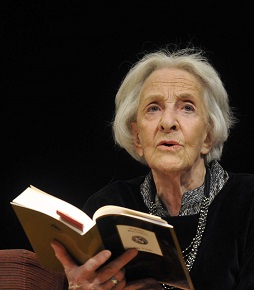De Uruguayaanse dichteres, schrijfster, vertaalster en letterkundige Ida Vitale werd geboren in Montevideo op 2 november 1923. Vitale speelde een belangrijke rol in de Uruguayaanse kunststroming die bekend staat als de ‘Generation of 45′. Zij groeide op in een cultureel ontwikkelde en kosmopolitische familie. In haar jonge jaren las zij graag historische werken. De ontdekking van een paar Uruguayaanse dichters van rond de eeuwwisseling, Delmira Agustini en, vooral haar geestverwante María Eugenia Vaz Ferreira, alsmede van Gabriela Mistral bracht haar op het pad van de poëzie. Zij studeerde geesteswetenschappen in Uruguay en werkte vervolgens als docente. In 1950 trouwde zij met de literaire criticus Ángel Rama. Ze scheidde van haar eerste echtgenoot en werkte mee aan het weekblad Marcha; tussen 1962 en 1964 redigeerde zijj de literaire pagina van de Uruguayaanse krant Época. Ze was mededirecteur van het tijdschrift Clinamen en trad toe tot het management van Maldoror Magazine. Gedwongen door de dictatuur vluchtte zij in 1973 naar Mexico, Zij breidde haar werkterrein uit met het schrijven van essays en literaire kritieken en vertaalde boeken voor het Economisch Cultuurfonds; ook gaf zij lezingen, nam deel aan jury’s en werkte samen met talrijke kranten. Zij keerde terug naar Uruguay in 1984 en redigeerde de culturele pagina van het weekblad Jaque. Sinds 1989 woont ze in Austin (Texas) met haar tweede echtgenoot, de dichter Enrique Fierro, en reist ze heel sporadisch naar Montevideo. In 2010 krreg zij een eredoctoraat van de Universiteit van de Republiek. Vitale vertaalt vooral uit het Frans en Italiaans, werk van o.a. Simone de Beauvoir, Benjamin Peret, Gaston Bachelard, Mario Praz en Luigi Pirandello. In 2009 ontving zij de Premio Internacional Octavio Paz de Poesía y Ensayo, in 2014 de Premio Internacional Alfonso Reyes. In 2016 de Premio Internacional de Poesía Federico García Lorca en in 2017 de Premio Max Jacob.
Merry-Go-Round
The carousel, the roundabout, the what-
do-you-call-it, the merry-go-round, they called
to me, like a candle flame, a chariot, a stag,
a swan and a horse, a rearing horse
circling round and round but prodigiously still,
so still he trotted up into the air
with organ pipes and little bells, the air
not moving the horse’s tail
all golden and white, but dangerous,
the danger of falling in the midst of flight,
of me falling and being forgotten
by Father, of getting off elsewhere
than where I got on, all at once alone,
no more clouds in my hair, no more wind,
I am lost, no more that delectable fear
of flying with both hands clutching
the horse’s mane now slipping my grasp, and I
am clay in a kiln of air that slowly recovers
a stillness of form, the form of beginnings,
of being alone without wings.
Undermining the Wall
Time’s mission: to measure itself against the wall,
undermine it, unknot its solid ties,
temper its blade. Mind your impatience:
a sigh returns as a storm.
A sunset peers out from behind
Batoví Hill, bleedingly splendid.
In your heart there should be ashes:
there still is blood.
Life: it comes with wings or briers,
a bouquet for the vase and smiles
or stony silence. Then, the wall.
Vertaald door Sarah Pollack

Ida Vitale (Montevideo, 2 november 1923)
